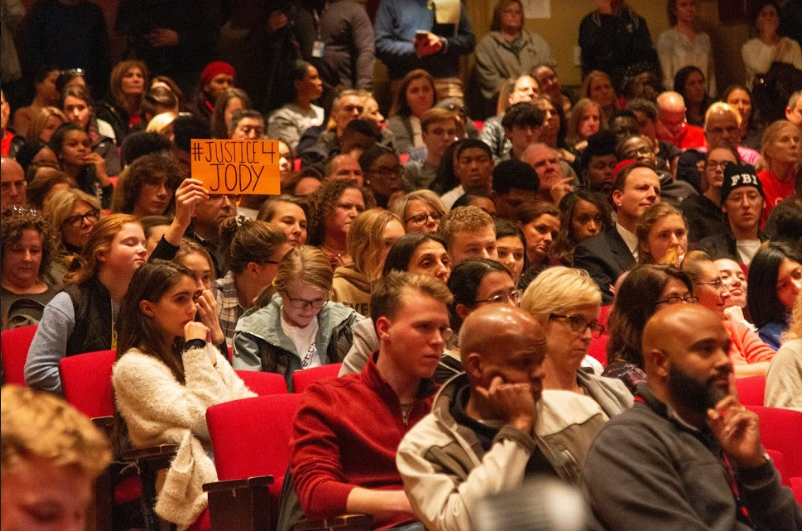Community Meeting Reveals Frustrations
The meeting, held last Thursday, quickly revealed discontent with recent personnel issues and long-standing racial concerns
November 12, 2018
The Shaker Heights Board of Education released a statement Nov. 9 at 10:17 p.m. acknowledging community frustrations and promising to take action after the Nov. 8 community meeting that unraveled quickly into criticism of the administration and an airing of community grievances.
The meeting was originally intended to assuage anxieties about the absence of Principal Jonathan Kuehnle, who was placed on administrative leave Nov. 1. However, the parameters of the meeting broadened after the release of a letter from Dr. John Morris, president of the Shaker Heights Teachers’ Association, detailing the district’s handling of the investigation of English teacher Jody Podl, about which the association has filed a formal grievance.
“If you are so inclined, I encourage you to attend tomorrow’s meeting at 6:30 at the High School Large Auditorium to ask leadership why we are treating our teachers this way,” Morris stated in the letter’s conclusion. “I hope to see you there.”
More than 900 people filled the large auditorium that night, standing in the back if they could not find a seat. Substitute Principal David Glasner, who is filling in for Kuehnle, and Interim Superintendent Stephen Wilkins sat on chairs at the center of the stage, holding microphones in their hands. Executive Director of Communications Scott Stephens stood at a podium to the side.
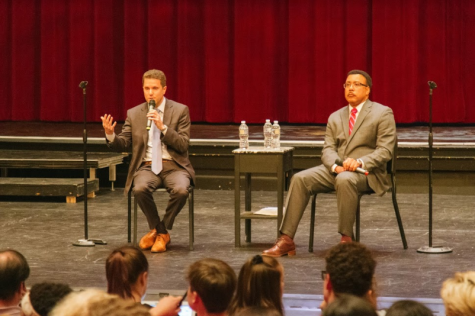
Glasner and Wilkins, answering questions during the first half of the meeting, before students and parents took the stage.
The meeting devolved into jeers and shouting soon after it began, and about halfway through, students took the stage and the microphone.
“Last night’s Community Meeting at the High School didn’t go as anybody wished,” the board message stated. “We witnessed the emotion, the passion and the frustration. We heard you. The climate in our community needs to be immediately addressed.”
“Immediately after the meeting, we reached out to our District legal counsel and other consultants to assess each personnel matter and to discuss the information we can share with the community,” the message continued. “While we go to great lengths to protect privacy, we expect to make more information available to you as soon as we can.”
The board listed the actions that would be taken to resolve the personnel troubles at the high school. These included evaluating a complaint to determine next steps; assessing the need to place a staff member on administrative leave pending a review; gathering statements from witnesses and other involved parties; and ensuring any absences or interruptions are limited in time and scope.
– Astrid Braun, Editor-in-Chief
Administration Approach to Questions
Also in the message, the board acknowledged that “we had the wrong format for this meeting and that we failed to give you the answers that you sought.”
At the start of the meeting, Stephens explained the format. “We have index cards and pencils in envelopes at the end of your aisle,” he said. “There’s little yellow golf pencils down there that you can use. And when you’re done writing the questions, please pass them down towards the center or to either side. We’ll have somebody pick them up and bring them up to me.”
A woman at the back of the auditorium immediately protested. “No! No!” she shouted at Stephens. “You will not sanitize our questions!”
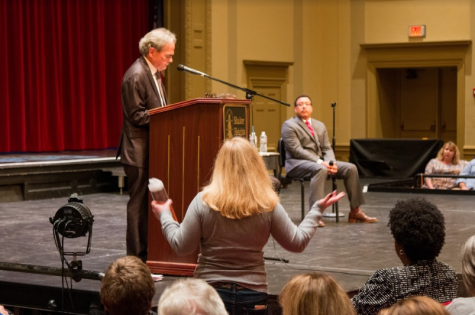
The first audience member to disrupt the meeting did so in the first few minutes. The woman pictured is challenging Executive Director of Communication Scott Stephens, at the podium, who relayed the meeting’s notecard format for questions.
Stephens responded, “We are reading questions. We are taking questions, written questions from the audience.”
“No paper! No!” the woman shouted back, as she walked up one of the auditorium aisles to the stage. “We want to ask questions directly.”
The meeting proceeded with Stephens reading questions collected from the audience. But throughout the 45-minute Q and A session, attendees shouted at Stephens from the crowd, asking him to read the questions directly from the notecards without interpreting them.
In a phone interview Nov. 9, Stephens said the notecard method has been used by the district for “maybe 15 years.” The approach was a continuing source of controversy throughout the meeting.
About halfway through the meeting, students began lining up in front of the podium, clutching their notecards. Eventually, senior Brianna Jarrell walked on stage and took the microphone from Glasner to speak.
After that, students and parents who wanted to talk either continued shouting from the audience, or traded microphone time.
-Print Managing Editor Emet Celeste-Cohen
Audience Behavior
The tone of the meeting was chaotic — and hostile.
Students, teachers, parents and community members comprised the meeting attendees, and though it was an adult who first disrupted the meeting, students eventually took the spotlight.
After initial outbursts from attendees who protested the use of notecards, people in the crowd made sure their voices were heard. Audience dissatisfaction manifested through booing, shouting, chanting, applauding and yelling at administrators.
In his opening remarks, Wilkins said there were some questions related to personnel matters and asked the crowd to be kind and civil. “Also be cognizant of our ethical and legal responsibilities to take care with discussion of these personnel items,” he said. Nevertheless, the crowd became increasingly frustrated with Wilkins’ vague answers.
When Stephens posed a question about how a man was “acting as an assistant football coach” despite a felony conviction, Wilkins responded, “Well, we’re gonna change that by hiring a new coach.” The crowd grew frustrated and started yelling, asking about the process for vetting coaches and why it failed.
One audience member said “How does a felon get hired?” Wilkins was then interrupted by shouts and did not answer the question.
Audience members consistently shouted out throughout the meeting, interrupting the momentum of the questions. A few times after Stephens posed a question, people yelled and jeered so long that no answer ever came. When Stephens moved on to the next question, the crowd started booing. One woman yelled, “Answer the question!”
Stephens also ignored questions voiced audibly from the crowd and asked another written question instead. Ignoring those inquiries made the audience madder, which led to demands that Stephens read questions as they were written.
An audience member yelled, “What about the emotional damage that’s already been done to Ms. Podl?”
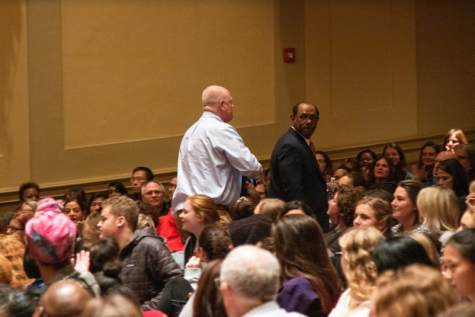
One audience member was lead out after he shouted repeatedly at the stage. The man disagreed with the format of the meeting and the answers given.
By this point, other community members had been lining up at the stage to urge Stephens to ask their questions. Eventually, they walked up on the stage, grabbed the microphone from Glasner, and began addressing the administration and audience.
One student was the first to command the administration’s direct attention. She led the way for other students to take the stage express their dissatisfaction.
Senior Brianna Jarrell said, “You know, students are the priority, but you won’t listen to us. Can you please listen to me?”
On stage, one father said he saw the meeting as an opportunity for the administration to help. “Your kids are asking for you to lead them. Do not offer them platitudes, plans, because by the time those plans work out, you’ve lost a lot of kids,” he said.
The father then handed the microphone to a student waiting beside Stephens. The student spoke about what he felt the administration needed to address.
Senior Alexis Winthrop took the stage after she was handed the microphone. “So, I can’t be the only one who noticed that these men right here have been dodging our questions all night,” she said. The audience applauded. “These men have been reading our questions incorrectly.”
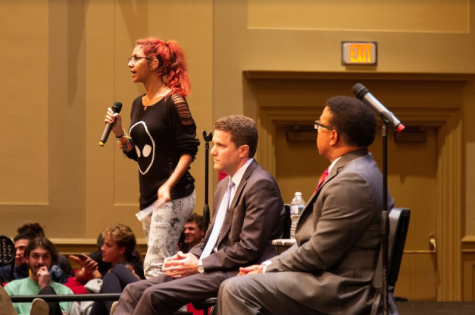
Senior Alexis Winthrop on stage near the end of the meeting.
One man was led out of the meeting by district head of security Vic Ferrell after he hollered at the administration relentlessly because he disagreed with how the meeting was handled.
The crowd applauded when students commanded the stage or when someone in the audience said something they agreed with. They also booed as the night went on when a question wasn’t answered clearly or was ignored.
The crowd also started chanting at times. After one question went unanswered, they booed and chanted, “We want answers! We want answers!”
In an interview immediately after the meeting, Glasner said he hopes people who felt their voices weren’t heard will come to his office and make them heard. “Honestly, it was a challenging meeting. There is no getting around that. I think it’s clear that we as a community have a lot to work through,” he said.
Stephens said his intention was to try to provide an opportunity for community members to ask questions. He said, “I think it’s up to them whether that was successful or not.”
–Web Managing Editor Mae Nagusky
Questions about the Podl Investigation
Community members asked about the Podl investigation, a topic largely avoided by the speakers.
Parents and students received an email Oct. 19 stating that English teacher Jody Podl had been placed on administrative leave pending investigation.
The Shaker Heights Teachers’ Association shared a letter that summarized events that led to Podl’s leave and the district’s investigative actions. The letter stated that two investigations were initiated. The first was completed by Dr. Marla Robinson, chief of staff, and concerned discrimination allegations. That investigation found no evidence of discriminatory behavior.
The second investigation was initiated by Principal Kuehnle before he was placed on administrative leave Nov. 1 and completed by Dr. Terri Breeden, assistant superintendent of curriculum and instruction. Kuehnle’s investigation concerned bullying and harassment claims.The SHTA letter criticized the handling of this second investigation and alleged Podl was not given due process because she was reprimanded without having a chance to respond to allegations.
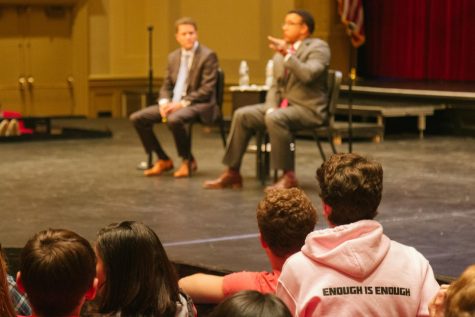
Students look on as Wilkins speaks to attendees.
“I’m really at a loss at why [the administration] chose this path,” Dr. John Morris, SHTA president, said in an interview. “I believe students. I believe they have to be able to make complaints. I believe that the process is important, but Dr. Robinson completed her investigation on October 24th. I believe the harassment investigation should have been completed October 24th. But that was the part of the investigation that Mr. Kuehnle was tasked with. So even if Dr. Breeden had taken that over, it should have been settled within that time frame unless they were looking for more evidence.”
At the meeting, community members asked, “Why was Ms. Podl not given an opportunity to defend herself in these accusations?” They also asked the definition of hazing and bullying as they used by the district.
Wilkins and Glasner responded to most of the questions about Podl by saying that they cannot discuss personnel matters. The questions about hazing and bullying were answered quickly and directly by reading the definitions from the faculty and student handbook.
Wilkins said that harassment and bullying is defined as a “persistent, intentional act that causes mental or physical harm.”
No further details about the Podl investigations have been given to the public.
“I don’t know what’s at work here. And I don’t want to make too many suppositions, but I think Ms. Podl was treated profoundly unfairly,” Morris said.
–Education Columnist Lauren Shepard
Questions about the Kuehnle Investigation
Another area of interest at the meeting was Kuehnle’s leave.
“You are legally obligated to eventually tell us why Mr. Kuehnle has been placed on leave. When will you tell us that and why haven’t you told us so far?” one submitted question asked. (The district is not legally obligated to inform the community of such personnel decisions, but residents can learn this information by making a formal records request).
Wilkins announced through an email sent to staff and parents Nov. 1 that Kuehnle was placed on administrative leave. The district has not provided additional information about why, stating that they cannot because it is a personnel matter.
“As we know, Principal Kuehnle is on leave, undergoing our review. That review will take some time. I don’t have a date that will be completed. Once that review is completed I will make a decision accordingly and move forward from there. At that time we will certainly let everyone know the way ahead,” Wilkins said in response to the question.
“How did it get to this situation? How did we get here today?” an audience member asked after Wilkins’ response. The question was not addressed, and Stephens moved on to another written question.
This lead to an uproar in the audience, with people demanding an answer. “You’re not answering the questions that people want the answers to!” one audience member shouted at the stage.
–Campus and City Editor Ethan Bloch
Questions about Racial Equity
For about the last half of the one-hour meeting, students and community members urged the administrators to address concerns about racial equity.
Senior Brianna Jarrell took a microphone from the stage and voiced frustration she felt about access to spaces for students to gather after school.
“Hello. So, I get that the whole students are a priority and everything, but I don’t believe that they’re listening to us because they’re too busy saying that we’re up to something. Especially us minority students,” Jarrell said.
“Because there aren’t many meetings where they actually hear the community out, I figured it was either that time or probably never,” Jarrell later said in a Shakerite interview. At the meeting, she said that when she was alone in the egress, a common meeting space for students, she was never reprimanded. However, when other African-American friends joined her, she continued, the group was reprimanded and told to move.
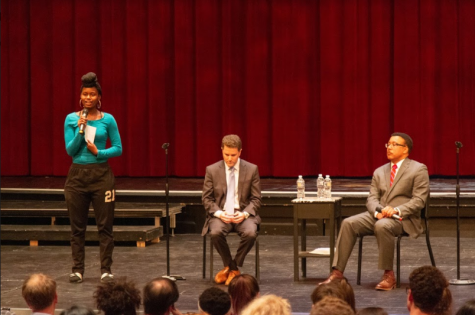
Senior Brianna Jarrell was the first student to take the stage, after asking Glasner whether he would “please listen” to her.
“Three more black students came around, and all of a sudden we had to leave,” Jarrell told the audience.
“I did want to directly talk to [the administrators] and I wanted the audience to hear me also,” she explained in the interview. “I believe that [Stephens] wasn’t thoroughly reading people’s questions nor was he addressing the issues that were constantly being asked.”
Jarrell said that there are disparities in the experiences of white students and minorities at Shaker, especially when it comes to discipline. “It’s not even just our school, it’s our society. If you see if a group of minority students, we’re typically up to something.”
In the meeting, Jarrell said supervision of areas where students gather after school is an easy fix. Glasner replied to Jarrell’s concern by saying he’s still in learning mode and he has been at Shaker for less than a week.
Jarrell, however, didn’t think her question was answered thoroughly. “I understand learning about your environment, but he is not new to the Shaker area,” she said in the interview. “He is not new to the district. He understands what the issues are. He knows most of the students, so I don’t think that was an appropriate answer.”
Following Jarrell’s comment, other students took to the stage to share their stories.
Junior Olivia McDowell took the microphone and announced she is the person the SHTA letter refers to as the “student who did not have an assignment completed.” She went on to criticize the inequity of student enrollment in upper level classes at the high school and questioned why the district’s efforts to address equity have not produced training for employees.
“I don’t want to get emotional, but I care about my education,” McDowell said. “Y’all sweep stuff under the rug and act like it just doesn’t matter — act like it’s not going on. I don’t get it. What about the damage to a student when they’re, what, one of three, one of five black kids in their class because of the whole education gap that y’all have?”
Following McDowell’s statements, parents and other members of the audience shouted their experiences. “I came out of Shaker in ‘89. The issues have not changed,” said community member Nate Phillips.
When the audience asked about what the district could do to make the experience better for African-American students, Glasner responded with reference to structures. “We need to provide excellent and equitable structures for everyone leading up to the high school. At the high school we must treat all students fairly, including looking at courses,” he said. “There’s much more we have to do.”
Jarrell said she is disheartened by the administration’s failure to take action on the issues the district is facing.
“It just seemed like they didn’t really care. I feel like it was pointless. It was just this time to hear us cry and shout and complain, and then they go home,” she said in the Shakerite interview. “I just don’t think the people on stage took the people and the community’s opinions and emotions seriously. They’re hearing us, but they’re not really listening.”
McDowell later told The Shakerite that Podl called her out for not completing an essay outline. McDowell said other classmates also failed to complete the assignment. “That just did not help the situation. I’m already a minority, and then you’re chastising me in front of my peers,” she said.
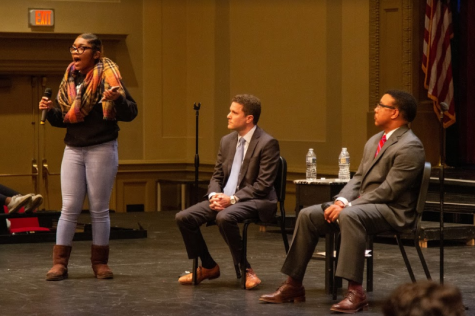
Junior Olivia McDowell addressed the audience soon after Jarrell, announcing that she was the student mentioned in the SHTA letter.
“Originally I was like, people make mistakes, it’s fine, it’s whatever. But I told my mom, and I’m not sure if my counselor made that report or my mom made that report,” McDowell said.
However, McDowell said she did not intend for her story to be turned into a racial dispute. “Everyone turns it into a racial thing. Especially last night at the meeting, and I never said she was racist. I don’t think she’s racist,” she said.
“I just want it to be known that I hoped it did not have to go this far. I don’t think she’s a bad person. I don’t think she’s a bad teacher. I was actually asking my mom, ‘When is she gonna come back? I need to do these college essays.’ I know she’s hard on grading,” McDowell said. “I feel like it’s important to have that kind of ‘tough teacher,’ but at the same time, there’s a way to balance it and deal with it.”
McDowell said she knows the high expectations of an honors or AP course. “I’ve taken nothing but honors classes my whole life and I’m proud to be able to say that. If I wasn’t capable and if I wasn’t ready, my English teachers in the past wouldn’t have recommended me for it, and my counselor wouldn’t have allowed me to do it,” McDowell said.
McDowell said her meeting comments led to a discussion of racial equity because there are a lack of minority students in higher level classes. “If you look at the demographics, in a core class it’s majority black students, and if you look at an honors class, it may be some black some white, but in AP/IB, you’ll be lucky if you get five black kids,” she said.
–Web Managing Editor Ellie Vahey and Investigations Financial Reporter Hilary Shakelton
Questions about the Football and Cheerleading Coaches
Stephens read a question from a notecard: “What is the process of hiring a football coach, or I guess any coach?” he asked. “Who’s in charge of that?”
Wilkins denied knowing anything about the former special teams coach with six criminal charges. He answered the question: “We’re gonna change that by hiring a new coach.”
After a roar of boos from the audience, Wilkins continued, “Those are the same type of questions that I asked, and when I talked about those things being investigated, those are the questions that I want answered.”
Wilkins emphasized that the the administration did not know that Jonathan Harrell, who was helping coach the high school football team, was a felon. In 2014, Harrell was indicted on six charges in Cuyahoga County Common Pleas Court for an offense committed Sept. 16, 2014: petty theft, disrupting public service, endangering children, domestic violence, abduction and attempted rape.
Harrell pleaded guilty to the charges of petty theft, domestic violence and abduction Oct. 22, 2015. The prosecutor dropped the remaining charges in exchange for the plea. Harrell was sentenced to 180 days in jail from the time he was indicted until the time he accepted the plea bargain, from September 2014 through June 2015.
Harrell was also sentenced to two years probation under the supervision of the domestic violence division and three years of post-release control.
In 2015, Harrell was indicted again for aggravated theft and possessing criminal tools for an offense committed Jan. 23, 2015. He pleaded guilty to a lesser charge of attempting to possess criminal tools, and the prosecutor agreed to drop the aggravated theft charge.
He was sentenced to 134 days in Cuyahoga County Jail. This included the time he was indicted until the time he made his plea. Harrell received credit for his time spent in jail during that interval and was released after his plea.
“We are working with the athletic director who is responsible for the interviews of those candidates,” Wilkins said.
After Wilkins spoke, members of the crowd yelled more questions. “Why wasn’t a background check done on him?” yelled one audience member. Another asked, “What is the process?”
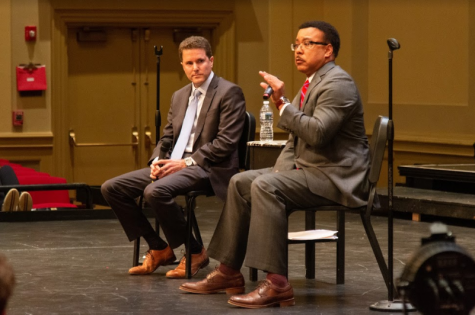
Wilkins, who is serving as interim superintendent, previously served as manager of business and operations for the district.
Wilkins said, “The process wasn’t followed. That’s why it is unacceptable.”
At Shaker, all head coaches, paid assistant coaches and volunteer assistant coaches must be vetted and fingerprinted at the administration building before they can coach.
Wilkins insisted that all coaches are required to be properly licensed. Following this, Stephens ended the discussion about the former special teams coach: “Anything more on that, or can we move on?”
Stephens also read a question asking for an update on the “cheerleader situation.” The question referred to the resignation of two high school cheerleading coaches after one was accused of humiliating a girl on the team for her weight.
“I’m not sure what an update on the cheerleader situation means,” Wilkins said. His response was met with loud and annoyed yells from audience members. He continued, “We have appointed new coaches surrounding the cheerleading squad.”
–Raider Zone Co-Editor Anna Krouse
Moving Forward
The Student Group on Race Relations has organized a meeting tomorrow at 6 p.m. in the high school’s upper cafeteria in order to discuss “race and bias in Shaker to heal and move forward as a community.”
The next school board meeting will be held Wednesday at 6 p.m., and there will be a public comment period during which community members may speak.
The school board’s message about the meeting ended with a paragraph on the superintendent search firm that was chosen the same day. The board plans to find a new superintendent by spring 2019.
–Astrid Braun, Editor-in-Chief
The Shakerite will continue to cover Kuehnle’s administrative leave, the SHTA grievance, upcoming meetings and more as the stories develop. A full annotated transcript of the meeting can be read here.
